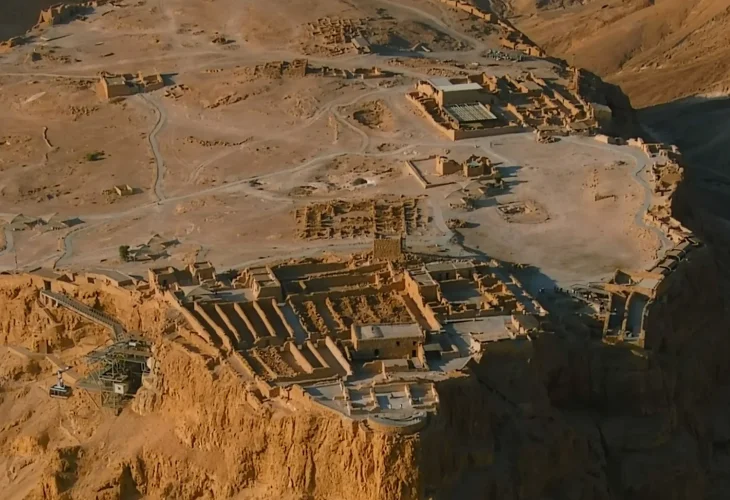Herod's Rise to Power: The Battle for Jerusalem
Herod sheltered his family in the stronghold of Masada while Antigonus laid siege. Escaping yet again, Herod aligned with the Roman legion to capture Jerusalem.
 Masada (Photo: Shutterstock)
Masada (Photo: Shutterstock)In 43 BCE, 113 years before the destruction of the Second Temple, Hyrcanus the High Priest had a change of heart. Tiring of his longtime confidant Antipater, he distanced himself and sought new advisors, including Milichus, a man with his own agenda. Milichus poisoned Antipater to ensure he could not sway the fickle king again.
Around this time, Julius Caesar was assassinated in Rome, sending the empire into turmoil. Taking advantage, the Parthians, Rome's rivals, advanced westward. Aristobulus' family, related to Hyrcanus, saw an opportunity for rebellion. The last son, Antigonus Mattathias, collaborated with the Parthians and declared himself King of Judea in 40 BCE, 110 years before the temple's fall. Alongside the Parthians, he targeted Antipater's sons. The cunning Herod managed to flee, first securing his family in the fortress of Masada. His brother Phasael, however, was captured by the Parthians and took his own life to evade torture. Hyrcanus was deposed, exiled to Babylon, and his ears were clipped to disqualify him from temple service.
For three years, Antigonus Mattathias ruled Judea. If he can be called a king, he was the last Jewish monarch to reign in Jerusalem since King David, of blessed memory. He minted coins featuring the menorah and the showbread table with the inscription "Mattathias the king and friend of the Jews," signifying trust in the Sanhedrin, akin to the early days of Yohanan the High Priest's reign. In 37 BCE, Herod allied with Roman Eastern Governor Mark Antony. Together, they launched a campaign against Antigonus Mattathias to restore Herod's control.
Herod sheltered his family in the Masada fortress while Antigonus laid siege. Yet again, Herod escaped, joining forces with the Roman legion, and they moved on Jerusalem. Antigonus attempted to dissuade the Roman general Silo by highlighting that an Idumean should not rule Jerusalem, as Hasmonean successors remained. However, the Romans were unmoved, and Antigonus resorted to launching arrows, forcing them to retreat.
Meanwhile, Herod and the Romans focused on dismantling opposition across the land. Hearing rebels were holed up in the arbel cliffs above the Sea of Galilee, Herod marched there with his army. The cliff fortress, hundreds of meters high, was accessed by rickety ladders. Any soldier attempting to breach it was shot or hurled into the abyss. Yet, Herod persisted, engineering special boxes open at the front. Soldiers inside them descended from the mountaintop, ambushing the rebels and killing them all.
Nevertheless, Antigonus maintained control over Jerusalem and Jericho. While Herod sought support in Rome, Antigonus struck his army unawares in the Jericho hills, momentarily defeating Herod's forces and killing his brother Joseph. However, upon Herod's return from Rome, flanked by celebrated commander Gaius Sosius, Antigonus' army fell swiftly. Antigonus himself was captured. Herod feared that the Roman Senate might heed Antigonus' claim to the throne, rooted in his Hasmonean lineage, so he pushed for his immediate execution. Mark Antony complied, beheading Antigonus. About fifty years ago, a majestic tomb was uncovered at Jerusalem's Mount Scopus, containing a decapitated body in a stone coffin labeled "Mattathias son of Judah." Some believe this is the burial site of the last king of Judea. Herod also ensured that Milichus, who poisoned his father Antipater, was executed.
With undisputed rule over Jerusalem, Herod sought stability. He brought back Hyrcanus son of Yannai, an old man, to appease the people by creating the illusion of Jewish leadership, knowing Hyrcanus was a mere puppet under his control.
What remained of the once illustrious Hasmonean dynasty? As noted in earlier chapters, Hyrcanus and Aristobulus, the sons of King Yannai and Queen Salome, became in-laws: Aristobulus' son Alexander married Hyrcanus' daughter Alexandra. All other descendants of Hyrcanus and Aristobulus perished. Yet, Alexander and Alexandra had two children: Aristobulus (the third) and Miriam, known as "Maryamme." Their father, Alexander, was killed by Pompey in battles against Herod. Thus, only four Hasmonean descendants remained: Hyrcanus son of Yannai, nearing 80 years old, his daughter Alexandra, his grandson Aristobulus, and granddaughter Maryamme.
This is how Herod ruled Jerusalem, overshadowed by the remnants of the Hasmonean dynasty.

